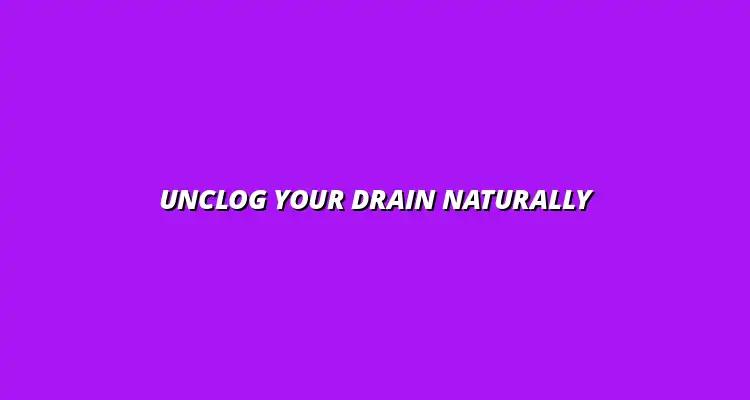
- Plumbing Basics
- Feb 17
2024-12-29
Drain clogs can be a real headache for homeowners! They can lead to slow drainage, bad odors, and even costly repairs. Understanding what causes these clogs is the first step in keeping your plumbing system running smoothly.
When drains become clogged, water can't flow freely, which can cause it to back up into sinks, tubs, or toilets. In some cases, this might even lead to water damage in your home. By learning about the impact of clogged drains, you can take proactive measures to prevent them. Learning to identify common plumbing problems is a great first step in home maintenance.
Clogged drains can have several unpleasant effects on your living space. For one, they can cause unsightly water buildup, making your home feel less clean and inviting. Additionally, standing water can lead to mold growth, which can be harmful to your health!
Not only that, but prolonged drain issues can lead to more serious plumbing problems. This may result in expensive repairs down the road. It's essential to address any signs of clogs as soon as they appear. If you're dealing with a clogged kitchen sink, you'll want to check out this guide on fixing a clogged kitchen sink.
There are several common culprits behind drain clogs. Knowing them can help you avoid future problems. Let’s take a closer look at some of the primary causes of these annoying blockages.
Clogs can happen anywhere in your plumbing system, but they often start in the kitchen or bathroom. Below are some of the most frequent offenders that lead to drain issues.
One of the leading causes of clogged drains, especially in the bathroom, is hair buildup. When you wash your hair, strands can easily get trapped in the drain. Over time, this creates a thick blockage along with soap scum, which also contributes to the problem. For easy solutions to unclog your bathroom drain, check out these unclogging tips.
To prevent this, consider using drain covers to catch hair before it goes down the drain. Regularly cleaning these covers can significantly reduce clogs.
In the kitchen, food waste and grease can be the main offenders. When you rinse dishes, leftover food particles can get washed down the drain. Grease can also harden and stick to the sides of pipes, creating a blockage over time.
To avoid this, always scrape plates before rinsing and avoid pouring grease down the sink! Instead, dispose of it in the trash.
Sometimes, clogs happen due to foreign objects that accidentally get washed down. This could include anything from small toys in the bathtub to excess paper products in the bathroom. These items can quickly cause a blockage.
To prevent this, be mindful of what goes down your drains. Make it a habit to check for any debris that might have been accidentally washed away. Simple fixes like learning how to fix a leaky faucet can prevent bigger problems down the line.
Taking care of your drains is essential to avoid the hassle of clogs. By implementing preventive measures, you can ensure smooth water flow and keep your plumbing system in good shape. Regular maintenance not only saves time and money but also prevents potential damage to your home. Consider these water-saving plumbing tips to reduce water waste and lower your bills.
To maintain clear drains, it's important to establish a consistent routine. You can focus on daily practices, as well as monthly check-ins, to identify and address any issues before they escalate. Let's explore some effective strategies to keep your drains clean and clog-free!
Maintaining your drains doesn’t have to be time-consuming. Incorporating a few best practices into your daily routine can make a significant difference. Here are some ideas to help you keep your drains clear:
In addition to daily care, consider a monthly maintenance routine. This can include deeper cleaning methods that will help prevent future clogs. Regular maintenance can also extend the lifespan of your water heater.
Setting aside time each month for drain maintenance can help you catch any problems early. Here are a few ideas for your monthly routine:
Being proactive about identifying possible issues can save you a lot of trouble down the line. Knowing the signs that indicate your drains need attention is crucial. Look out for the following:
Addressing these signs early can help prevent bigger issues from developing. If you notice any of these problems, don’t ignore them! For more serious plumbing issues, consider contacting a local professional such as a plumber in Great Barr, Birmingham.
When you notice early signs of clogs, quick responses can help you avoid more severe problems. Here are some actions you can take:
This is a common question! While natural solutions like baking soda and vinegar work well for many clogs, they may not be effective for everyone. More stubborn clogs, especially those caused by large foreign objects, might require professional help.
When using natural methods, it’s important to avoid certain practices. Don’t use excessive force with tools, as this could damage your pipes. Also, avoid combining different cleaning agents as they can create harmful reactions!
Regular cleaning is key to preventing clogs. I recommend checking and cleaning your drains at least once a month! However, maintaining daily habits can greatly reduce the likelihood of issues.
In summary, effective drain unclogging techniques can save you time and money in the long run. By implementing preventive measures, you can keep your drains in great shape!
I encourage you to adopt natural methods for drain care! They are not only effective but also environmentally friendly, making them a great choice for everyone. Happy draining!
